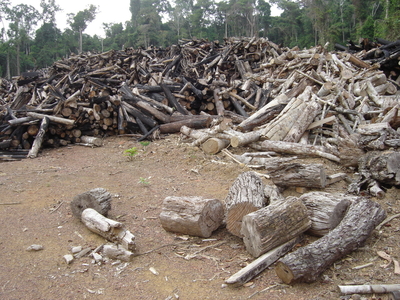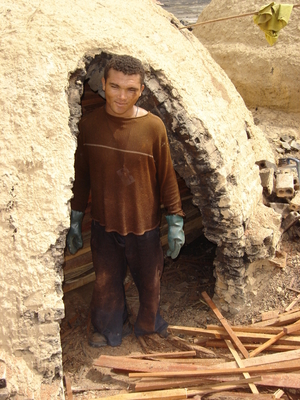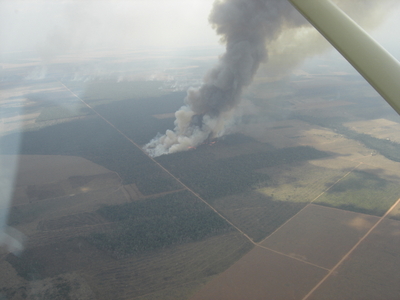
Pará – Brazil, 2007. Photo by Deborah Icamiaba.
The Brazilian National Institute for Space Research (INPE) has disclosed the news of a huge increase in deforestation in the past few months, particularly in the States of Pará and Mato Grosso. In some States, the rates are three times higher than they were in August 2007.
The Minister for the Environment, Carlos Minc, interpreted this as due to the election period. According to him, “No mayor wants to be obstructive at such times. No governor wants to be obstructive either. The IBAMA (Brazilian Institute of Environment and Renewable Natural Resources) staff do their job, but they need the support of the local police.” Minc has also disclosed a list of the top 100 agents of deforestation, which puts the government agency for colonization and agrarian reform (INCRA) as the top deforestation agent of the Amazon.
Brazilian bloggers have been slow to react to the news, but Greenpeace [pt] points out it had been indicating increasing deforestation rates in the past few months, thus the INPE data has come as no surprise to them. Amazon Greenpeace Campaign Director Paulo Adario says:
“Lamentavelmente não é nenhuma novidade. Há meses, o Greenpeace vem alertando para a tendência de aumento do desmatamento na Amazônia, confirmada novamente pelos dados do Inpe divulgados nesta segunda-feira”
Also, regarding the presence of INCRA at the top of the list, Greenpeace had published a report called Paper Land Reform Settlements [pt] denouncing the way in which in some parts of the Amazon INCRA staff have been “partnering” small peasants and illegal loggers to create “fake” land reform settlements which serve to cover up illegal logging activity under the gloss of land reform and social justice. The set up helps INCRA to meet their land reform targets, earn their local agents’ monetary rewards and makes way for what is still the main economic activity in numerous Amazonian municipalities: illegal logging.
Candido Cunha [pt], a blogger from Santarém, Pará, was quick to expose some of the political interests behind the recent news. According to him, there is disagreement between Minister Carlos Minc and Pará’s Governor Ana Julia who was not happy to see Pará at the top of the deforestation list. Candido suggests she had been able to keep Pará out of the notorious deforestation limelight during Marina Silva’s period of office (she is Minc’s predecessor), whose focus was to attack Governor Blairo Maggi from Mato Grosso State, whilst keeping herself free to “partner” deforestation agents, particularly those linked to large mining and logging projects.
A mistura explosiva dos aliados petistas no Pará, madeireiras e mineradoras parece ser o combustível perfeito para a derrubada e queima da floresta amazônica. Para isso, não há “simpatia” que dê jeito!
They being all PT (Workers’ Party) politicians, this is indicative of inner schisms in the party. In Candido's view, Minc’s strategy to reveal the links between local politics and deforestation rates is intended to help him gain the support needed to set up a Federal Military Force to support IBAMA’s fiscalization proceedings.

Pará – Brazil, 2007. Photo by Deborah Icamiaba.
In Mércio Pereira Gomes’ blog [pt], we see the view of an anthropologist (and ex-president of FUNAI, Brazilian National Indian Foundation, during Lula’s office) who has witnessed the threat of having INCRA's land reform settlements near indigenous reserves, particularly in Mato Grosso.
Parece que houve um acirramento do desmatamento no mês de agosto. O ministro Carlos Minc culpou as eleições por isso. O Pará está tomando o lugar do Mato Grosso como campeão do desmatamento. A governadora do Pará desmentiu que as eleições provocaram esse aumento, que não há correlação entre uma coisa e outra.
He seems to support Ana Julia's refutation that there is any link between elections and deforestation and argues that the deforestation battle is being lost due to Minc’s strategies being too “mediatic” (seeking to draw attention to himself, primarily) and not consistent enough on the ground. He does not believe Minc will last in the Ministry. Is he perhaps an ally to Ana Julia?
According to Globo’s site [pt] on the Amazon, Carlos Mincs’ idea is to partner the General Advocacy of the Union and the Public Ministry to sue the top 100 deforestation agents in Brazil.
Os dados do Ibama apontaram situação grave, segundo Minc. Pelo levantamento, além de áreas de assentamentos, houve desmatamento também em reservas indígenas e parques de preservação ambiental. “Todos aqueles mencionados (na lista) terão de responder na Justiça sobre o que aconteceu. O mais importante é mudar a atitude e recuperar as áreas devastadas”, afirmou o ministro.
Finally, the blog Pense [Think, pt], run by the couple Adriana and Henrique, indeed makes us think about the issue of who will sue the top 100 deforestation agents, particularly INCRA, which is itself a Federal Government Agency.
Quem será processado pelo ministro? O Incra? As famílias assentadas?
Mediatic or not, the fact is that deforestation rates are on the increase and as difficult as it is to disentangle the network of interests which converge to maintain such high rates of deforestation in the Amazon, Carlos Minc is using the tools that he has in order to tackle the problem. Drawing attention to the increase in deforestation rates and listing top deforestation agents, as well as following this up with legal proceeds against them, are strategic tools to combat deforestation.
However, as he himself has been saying in the media recently, closing down illegal logging activities does not resolve the problem, because “you don’t create sustainable jobs as quickly as you close down illegal sawmills.” Perhaps the conflict between himself and the Governor of Pará is that his duty is to denounce and close down the illegal deforestation related activities, whilst hers (and that of all the local mayors about to be elected) is to create all those sustainable jobs.

View from a plane, north of Mato Grosso – Brazil, 2007. Photo by Deborah Icamiaba.







6 comments
The deforestation problem was always a social and political question in Brazil. Aside from the big corporations, always present in these cases, the major actors of Amazonian deforestation are usually people that had little choice, and sometimes work at the illegal logging business as their only chance for a reasonable life. By the other hand, it is very common for people to get stuck in these superficial analyses, and forget to connect the dots between social conflict, corruption and environmental problems in Brazil. In the same way some cabinet environmentalists forget that people have to earn a living somehow, some politicians and social activists forget (or fail to see) that the environment can’t take any more abuse. It’s the land of the half-blind.
By the way, congratulations for your great début at Global Voices, Deborah.
Best wishes,
Daniel Duende.
Congratulations Deborah. Parabéns!
I’m an American (US) who loves forests and I have a special attachment for Amazônia. I’m very grateful to you for giving us a deeper view of the complexities and all the challenges — social and political as well as ecological.
I look forward to more insights from you. Thank you for the excellent job.
Lamentavelmente as políticas ambientais estão subordinadas a interesses eleitorais!
Parabéns Deborah por seu excelente trabalho!
Stephen
great article Deborah, looking forward to more. I second the congratulations, welcome to GV.
Best,
Juliana Rotich.
Hi Deborah!
I recently met a Brazilian biologist. She explained to me the important role bats play in the ecology of forests. from control of insects to nutrient recycling, and that for every bat up to 800 plants and trees will grow around the world! I was really amazed!